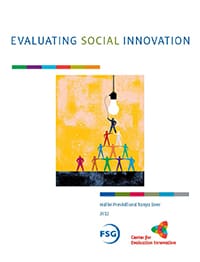Mayur Patel, former VP of strategy and assessment at Knight Foundation, discusses working with FSG on a developmental evaluation of Knight’s Community News and Information project.
Evaluating innovative social change efforts can be challenging because traditional approaches aren’t designed for complex and evolving initiatives. Philanthropic leaders working in a dynamic environment are increasingly turning to developmental evaluation to support the adaptation that is crucial to innovation. Written in collaboration with the Center for Evaluation Innovation, this report explores ways to evaluate more effectively in this environment. Examples include the Knight Foundation, The Bill & Melinda Gates Foundation, and The J.W. McConnell Family Foundation.
Top Takeaways
-
Innovative grantmakers must ask themselves whether and how philanthropic practices temper or nurture the spirit of trial, error, and adaptation that is at the core of innovation.
- One of the most transformative changes that grantmakers can make in support of innovation is to think about and use evaluation differently.
- Traditional formative and summative evaluation approaches are no match for new and innovative programs and initiatives that experiment with solutions to complex social problems. The future of evaluating social innovation is in the use of developmental evaluation.

